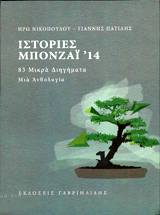.
.
Δήμητρα Ἰ. Χριστοδούλου
.
Καύκα (Kawka)
.
ΟΥΛΕΥΕ μαζὶ μὲ τὸν πατέρα του, τὸν θυρωρὸ στὸ συγκρότημα τῶν κατοικιῶν ποὺ μέναμε. Ὅπως ὅλα τῆς περιοχῆς τῶν λευκῶν, κάλυπτε περιφερειακὰ ἕνα οἰκοδομικὸ τετράγωνο καὶ στὸ ἐνδιάμεσο κενὸ διέθετε μεγάλο κῆπο. Ὁ Καύκα ἐρχόταν τὸ πρωὶ κι ἔφευγε τὸ βράδυ μαζί του. Ἔκανε τὰ θελήματα τῶν ἐνοίκων. Συνήθως τὸν ἔπαιρναν μαζί τους στὴν μαρκέτα, ὅπου περίμενε ἀκίνητος, ὡς ὄφειλε στὴ γωνία, μέχρι νὰ τελειώσουν γιὰ νὰ κουβαλήσει ὅλα τὰ ψώνια. Ἄλλοτε τὸν ἔστελναν νὰ πετάξει τὰ σκουπίδια. Καθημερινὰ ἔπρεπε νὰ ταΐσει τὶς χελῶνες, τοὺς παπαγάλους, τὰ παγώνια καὶ τὶς πάπιες τοῦ κήπου μας καὶ νὰ περιποιηθεῖ τὰ δέντρα καὶ τὰ λουλούδια. Ὅταν δὲν εἶχε τί νὰ κάνει κούρνιαζε κάτω ἀπὸ τὴν τυφλὴ κουπαστὴ τῆς σκάλας ποὺ ὁδηγοῦσε στὸν ἀκάλυπτο. Καὶ περίμενε. Ἀπὸ τὸ παράθυρό μου παρακολουθοῦσα τοὺς ἀεικίνητους βολβούς του στὸ σκοτάδι.
Ὅταν ἤμουν ἄρρωστη ἢ ἔκλεινε λόγῳ ταραχῶν τὸ σχολεῖο, ξέφευγα ἀπὸ τὴν τροφό μου, τρύπωνα κάτω ἀπὸ τὴν κουπαστὴ καὶ περίμενα μαζί του. Ἔβγαζα κι ἐγὼ τὰ παπούτσια μου καὶ τὰ ἄφηνα ἔξω ἀπὸ τὴν κρυψώνα. Μὲ τὸν καιρὸ μὲ ἄφησε νὰ κάθομαι κοντά του, μέχρι ποὺ ἔφτασα νὰ ἀκουμπῶ τὸ μπράτσο μου στὸ μπράτσο του. Ὅσο περιμέναμε νὰ τὸν φωνάξει κάποιος, προσπαθοῦσα νὰ συγχρονίσω τὴν κίνηση τῶν βλεφάρων μου καὶ τὴν ἀναπνοή μου μὲ τὴ δική του. Παρατηροῦσα τὰ δάχτυλα. Τὰ νύχια. Τὸ σχῆμα τῶν ποδιῶν του, μὲ τὶς ὧρες. Ἔψαχνα νὰ ἐντοπίσω σημάδια ἀπὸ χτυπήματα στὶς κνῆμες, συγκρίνοντάς τες μὲ τὶς δικές μου, ποὺ οἱ μελανιὲς ἦταν ἐμφανεῖς καὶ μετρήσιμες. Ὅσο περιμέναμε, σταυρώναμε τὶς παλάμες μας καὶ τὶς ἀκουμπούσαμε στὰ λυγισμένα γόνατά μας. Ὅταν μυρμήγκιαζαν τὶς τινάζαμε μὲ ἕναν ἀλλοπρόσαλλο βουβὸ σπασμὸ τοῦ κεφαλιοῦ καὶ τῶν χεριῶν μας. Ἔπειτα μέναμε πάλι ἀκίνητοι πνίγοντας τὰ γέλια μας.
Ἕνα πρωί, ὁ πατέρας του, ὁ θυρωρός μας, κατέβηκε ἀθόρυβα τὴ σκάλα ἀπὸ πάνω μας κι ἔχωσε ξαφνικὰ τὸ κεφάλι του μέσα στὴν κρυψώνα μας. Μᾶς τσάκωσε νὰ περιμένουμε κουρνιασμένοι στὸ σκοτάδι, τὸ μπράτσο του νὰ ἀκουμπάει τὸ δικό μου. Μᾶς κόπηκε ἡ ἀνάσα, ἀλλὰ παραμείναμε ἀκίνητοι κι ἑνωμένοι, ὅσο τὸν κατσάδιαζε στὰ σουαχίλι.
Ἀπὸ τὴν ἑπόμενη μέρα δὲν τὸν ξαναέφερε μαζί του. Λίγες ἑβδομάδες μετά, σηκώθηκα ἕνα πρωὶ νωρίτερα ἀπὸ τοὺς γονεῖς μου καὶ ἤπια μονορούφι τὸ ρὸζ σιρόπι γιὰ τὸ βήχα ποὺ βρῆκα στὸ μπάνιο μας. Στὸ νοσοκομεῖο μᾶς μετέφερε ὁ θυρωρός μας, ὁδηγώντας, ὁ τρελός, χωρὶς ἄδεια τὸ αὐτοκίνητό μας.
.
.
Πηγή: Πρώτη δημοσίευση.
Δήμητρα Ἰ. Χριστοδούλου (Γιοχάνεσμπουργκ). Μεταπτυχιακὴ εἰδίκευση στὴν Πολιτιστικὴ Διαχείριση, Τμῆμα Μέσων, Ἐπικοινωνίας καὶ Πολιτισμοῦ, Σχολὴ Διεθνῶν Σπουδῶν καὶ Ἐπικοινωνίας τῶν Κοινωνικῶν καὶ Πολιτικῶν Ἐπιστημῶν, Πάντειο Πανεπιστήμιο. Ἀπόφοιτη Ἑλληνικοῦ Ἀνοικτοῦ Πανεπιστημίου, Τμῆμα Ἀνθρωπιστικῶν Σπουδῶν, Εὐρωπαϊκὸς Πολιτισμός, Ἀπόφοιτη Ἰσπανικοῦ Πολιτισμοῦ, Πανεπιστήμιο Menendez Pelayo, Santander, Μεταφράστρια, Βρετανικὸ Συμβούλιο καὶ Ἰνστιτοῦτο Γλωσσολογίας, Λονδίνο.
.
Filed under: Ελληνικά,Ηλικίες,Καθημερινά,Μονόλογος,Μοναξιά,Ξένοι-Ξενιτειά,Οικογένεια,Πόλη-Χώροι,Περιγραφή,Φύλα,Φιλία,Ψυχή | Tagged: Δήμητρα Χριστοδούλου,Διήγημα,Λογοτεχνία | Τὰ σχόλια στὸ Δήμητρα Ἰ. Χριστοδούλου: Καύκα (Kawka) ἔχουν κλείσει














